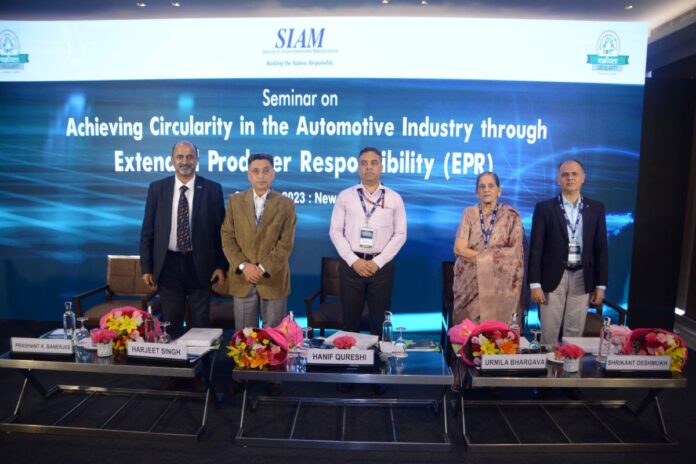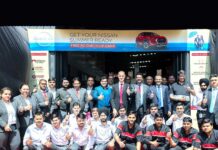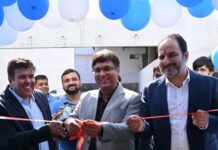
In order to drive circular economy, the Society of Indian Automobile Manufacturers (SIAM), the apex automotive industry body, organised a seminar on ‘Achieving Circularity in the Automotive Industry through Extended Producer Responsibility (EPR)’. This event, held under the umbrella of SIAM’s Chakriyata (Circularity) initiative and aligns with the vision of the Government of India’s aim to promote sustainable mobility and foster a circular economy. The seminar emphasised how effective EPR implementation can contribute to Aatmanirbhar Bharat, Circular Economy, Decarbonisation, LiFE (Lifestyle for Environment) and achieve targets of UN Sustainable Development Goals 2030.
The seminar witnessed active participation of several coveted speakers including senior government officials, industry leaders, and automobile experts, discussing the ways to enhance their commitment to sustainable practices, reduce environmental impact and support the nation’s vision for self-reliance and circularity in the automotive sector.
The inaugural session, themed “EPR- A key tool for low-carbon transition in the Automotive Industry”, was graced by Chief Guest Dr Hanif Qureshi, Joint Secretary, Ministry of Heavy Industries. The session also witnessed the participation of Mr Shrikant Deshmukh, Chairperson, SIAM Recycling Group and General Manager, Product Homologation – Certification and Regulations at Mercedes-Benz India Pvt. Ltd., Mr Harjeet Singh, Executive Advisor- Technology, Hero Motocorp Ltd., and Ms Urmila Bhargava, Chairperson, IFP Petro.
In his welcome address on behalf of the automobile industry, Mr Prashant K Banerjee, Executive Director, SIAM, said, “ERP is an integral part of the Government of India’s vision for a circular economy. Considering the wastes our industry generates, we have a fantastic opportunity to turn them into assets. The automobile industry has always advocated the creation of sustainable economy and reducing carbon footprint. The sector is devoted to exerting serious effort and helping India adopt circular economy principles.”
Chief Guest, Dr Hanif Qureshi, Joint Secretary, Ministry of Heavy Industries, said, “Our Prime Minister envisions a more sustainable, integrated, and circular economy. The PLI programme is one of the government’s futuristic initiative towards realising the sustainability goals by supporting industries to operate in a sustainable way. India manufactured 2.6 crore vehicles in the FY 2022-23 due to PLI and PLI ACC schemes. We must consider the next 15–20 years and devise creative strategies and solutions to help us achieve our recycling and reuse objectives. The Indian Government is eager to collaborate with the sector and support its initiatives.”
Mr Shrikant Deshmukh, Chairperson, SIAM Recycling Group, said, “Understanding and religiously following ERP has become essential to create a sustainable future and we must outline a strategic framework to move towards the same. The Indian motor industry has consistently backed government efforts to promote the circular economy because it holds these ideas in high respect.”
88-year old veteran industry leader, Ms Urmila Bhargava, Chairperson, IFP Petro, encouraged participants to move swiftly towards creating a robust ecosystem for the growth of circular economy. She highlighted why India should place greater emphasis on the collection of used oil, recycling and reusing it.
Thematic Session 1, themed “ERP Regime for Battery and E-waste Management”, was chaired by Mr Vijay Prakash Yadav, Director CPCB. The session included thematic presentations from Mr ALN Rao, CEO Exigo Recycling-India, on “ERP Regime in Battery Waste Management Rules on Challenges in achieving various targets for sustainable battery waste management”, Mr Anirban Bhattacharya, Amplo Global USA, on “Artificial Intelligence driven platform for enhancing ESG performance on a demo of a case for automotive battery Circularity”, and Dr Suneel Paney, Director, Environment & Waste Management, TERI, on “Role of ERP in fostering Decarbonisation, Circular Economy & Sustainable Mobility”. Mr Rashid Hasan, Senior Advisor, SIAM, was also present during the session.
Thematic Session 2, themed “ERP Regime for Used Oil and Plastic Waste Management”, was chaired by Mr Sudhir Kumar, Ex-Niti Aayog, and moderated by Mr Prabhjot Sodhi, Senior Program Director-Circular Economy, Centre for Environment Education (CEE) India. The session included thematic presentations from Mr Anant Bhargava, CEO & Director IFP Petro, on “Sustainable Recycling of Use of Used Oil: Impact of EPR Regime”, Mr Anirudha Jalan, Co-founder & CSO, Recykal, on “Issues and Challenges in achieving the various targets envisaged under ERP regime in plastic waste management rules 2022”, Mr Manish Agarwal, Owner Vrindavan Plastic Industries, on “Opportunity & challenges for plastic recyclers”, and Mr Paras Gupta, Head ERP Sustainability and Marketing at Gem Enviro Management Pvt Ltd., on “ERP Role in Sustainable Plastic Waste Management vis-à-vis informal sector”.
Thematic Session 3, themed ‘ERP Regime for Tyre Waste & ELV Management”, was moderated by Mr Anand Kumar, Director, CPCB. The session included thematic presentations from Mr V K Mishra, ITTAC Chairman, on “Challenges of EPR Implementation for Waste Tyres: An Indian Perspective”, and Mr Sanjay Banati, MRAI- Executive Committee Member, on “Strategies for closing the loop of circularity in the tyre waste management”.
The thematic sessions were followed by a panel discussion around “Extended Producer Responsibility Fostering SDG 2030”. Mr. Masaru Akaishi, MD, Maruti Suzuki Toyotsu India Pvt Ltd., Mr Anirudh Kedia, Director AKK Recycling, and Mr Kartik Nagpal, President, Rosmerta Group, took part in the discussion and shared their invaluable insights on how effective EPR implementation will facilitate the attainment of SDG goals by 2030.









